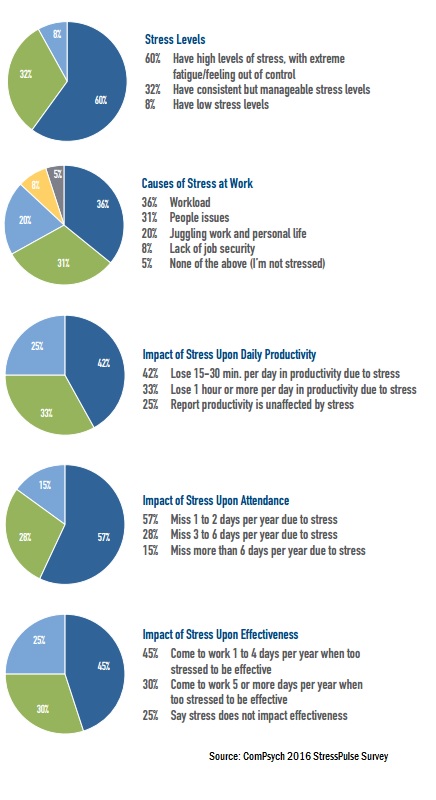Every employer has their own idea of a dream team, but most will agree it would consist of employees who are passionate about their careers, put forth extreme effort, and hit their goals every month. While this deep passion creates driven employees, what happens when the pressure becomes too much to handle?
In an ideal situation, every employee would feel comfortable confiding in their leaders and peers, but this isn’t always the case. Many workers believe they can’t show weakness or cracks from the pressure, which results in them buckling under the stress. This type of work burden leads to unhappy employees who may be missing work due to stress-related health issues.
 Work stress and anxiety is becoming epidemic in America. According to Project Time Off’s Overwhelmed America: Why Don’t We Use Our Paid Time Off report, nearly three-quarters of workers say they are stressed at work.
Work stress and anxiety is becoming epidemic in America. According to Project Time Off’s Overwhelmed America: Why Don’t We Use Our Paid Time Off report, nearly three-quarters of workers say they are stressed at work.
Last year, a ComPsych/StressPulse survey of 2,000 workers nationwide, found 60% of workers experienced stress so high they were extremely fatigued or often felt out of control. Another 32% said they had constant, but manageable stress. These high amounts of stress impact productivity — 75% said they lose up to an hour of productivity a day — costing employers a collective $300 billion.
The toll it takes on employers and employees alike suggest employers need to create a workplace culture where employees feel comfortable expressing their emotions and needs. This is why you need to create a safe place for employees to open up.
Emotions heighten passion and drive
Passion and drive are directly linked to employees’ motivation in their careers. Those who have an emotional connection to their work are much more likely to hit their goals and expectations.
Unfortunately, an alarming 57% of those surveyed in the September 2015 study by Achievers, The greatness gap: The state of employee disengagement, said they aren’t motivated by their company’s mission. Not understanding the value of their work or the inability to connect to the end results of their tasks creates a detrimental disconnect between employees and their jobs.
Those who bottle up emotions about work are more likely to end up overly stressed and, as a result, burnt out. This not only hurts employees, companies lose quality employees thanks to their inability to express concerns about their job.
Work martyrs are a prime example of those who push themselves to the limit. Unfortunately, 47% of employees who are unhappy with their job believe it is a good thing to be seen as a work martyr by their boss, according to Project: Time Off’s The Work Martyr’s Cautionary Tale report which surveyed 5,641 workers earlier this year.
The very definition of a work martyr is someone who makes great sacrifices for work, but in the end, this very passion could end up costing them their jobs. This is why it’s important leaders encourage employees to share the same emotion and passion when it comes to their workload and health. Here’s how:
Set an example: Employees who see the leaders of the company staying until all hours of the night, never taking a day off, and never opening up about their concerns will follow in the same footsteps. It’s a manager’s job to set expectations for the entire team, so it’s important to prioritize taking time off and leaving the office each day at a reasonable time.
Most likely, your employees do want to take time for themselves or their families, but don’t want to be viewed as a weak link. Open up with employees. Let them know they’re doing well and it’s important for the health of their jobs and their own well-being to take time for themselves.
Involve employees: Not feeling free to express their emotions leaves some employees overly stressed about their workload, goals, and deadlines. Use weekly or monthly meetings to work with employees on expectations.
It’s crucial employees know they can be honest about what they feel is reasonable or if the workload is overwhelming. Leaders can do this by giving them multiple options enabling employees to choose which they feel is an appropriate challenge.
Check-in often: Keeping emotions in check is habit for most employees, and they won’t change overnight. It will take a lot of work from company leaders to instill trust, and a non-judgmental environment. For highly competitive careers, like sales, it’s an even greater necessity to make sure employees aren’t getting crushed by the pressure.
Sit down with employees on a regular basis. Try sharing your own experiences, fears, and emotions from current and past situations. If some employees are feeling overly stressed, make a separate list of goals for that week/month on how to resolve some of the pressure.
Do you think it’s important for employees to express their emotions at work? Why or why not?
